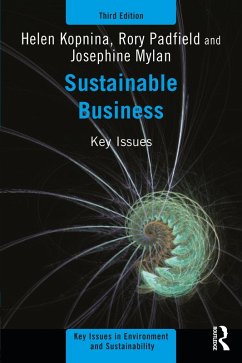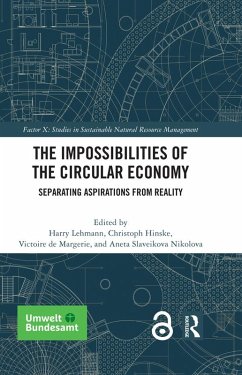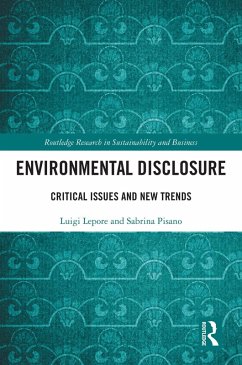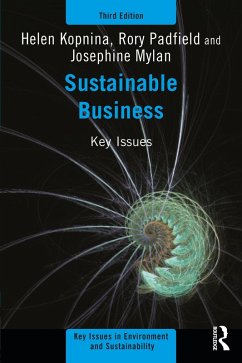
Routledge Handbook of Environmental Accounting (eBook, ePUB)
Versandkostenfrei!
Sofort per Download lieferbar
43,95 €
inkl. MwSt.
Weitere Ausgaben:

PAYBACK Punkte
22 °P sammeln!
This handbook showcases the broad spectrum of diverse approaches to environmental accounting which have developed during the last 30 years across the globe.The volume covers a range of physical issues such as water, carbon and biodiversity, as well as specific accounting matters such as management control, finance and audit. Moreover, seven chapters present environmental accounting issues that arise in the regions of Africa, Asia, Europe, MENA, North America, the Pacific and South America. The handbook also highlights future challenges in all the topic areas addressed as well as introducing ne...
This handbook showcases the broad spectrum of diverse approaches to environmental accounting which have developed during the last 30 years across the globe.
The volume covers a range of physical issues such as water, carbon and biodiversity, as well as specific accounting matters such as management control, finance and audit. Moreover, seven chapters present environmental accounting issues that arise in the regions of Africa, Asia, Europe, MENA, North America, the Pacific and South America. The handbook also highlights future challenges in all the topic areas addressed as well as introducing new topics, such as links between environmental accounting and the circular economy, and the issues associated with animal rights. Edited by leading scholars in the area and with key contributions from across the discipline, and covering a diverse range of perspectives and locations, the volume is divided into five key parts:
. Part 1: Framing the issues
. Part 2: Financial accounting and reporting
. Part 3: Management accounting
. Part 4: Global and local perspectives
. Part 5: Thematic topics in environmental accounting
This handbook will act as a significant publication in drawing together the history of the field and important reference points in its future development, and will serve as a vital resource for students and scholars of environmental accounting and environmental economics.
The volume covers a range of physical issues such as water, carbon and biodiversity, as well as specific accounting matters such as management control, finance and audit. Moreover, seven chapters present environmental accounting issues that arise in the regions of Africa, Asia, Europe, MENA, North America, the Pacific and South America. The handbook also highlights future challenges in all the topic areas addressed as well as introducing new topics, such as links between environmental accounting and the circular economy, and the issues associated with animal rights. Edited by leading scholars in the area and with key contributions from across the discipline, and covering a diverse range of perspectives and locations, the volume is divided into five key parts:
. Part 1: Framing the issues
. Part 2: Financial accounting and reporting
. Part 3: Management accounting
. Part 4: Global and local perspectives
. Part 5: Thematic topics in environmental accounting
This handbook will act as a significant publication in drawing together the history of the field and important reference points in its future development, and will serve as a vital resource for students and scholars of environmental accounting and environmental economics.
Dieser Download kann aus rechtlichen Gründen nur mit Rechnungsadresse in A, B, BG, CY, CZ, D, DK, EW, E, FIN, F, GR, HR, H, IRL, I, LT, L, LR, M, NL, PL, P, R, S, SLO, SK ausgeliefert werden.













